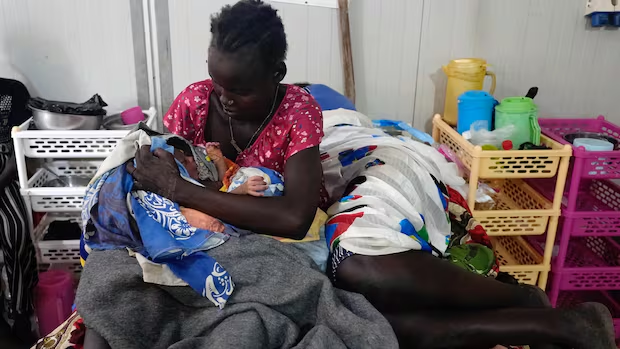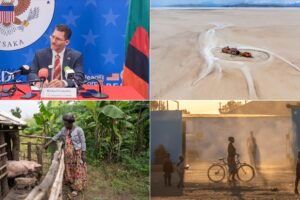
Canada is being accused of retreating from its role as an international development leader after the Liberal government’s budget announced it will cut $2.7 billion in foreign aid over the next four years.
Those cuts, the budget said, would show up in reductions to Canada’s “development funding to global health programming” and in its transfers to “international financial institutions,” but no specific details were given.
“Global health funding really is somewhere that Canada does have a good recent record in and it’s really unfortunate that it’s stepping back after seeing what the impact of other peer countries stepping back is doing,” Doctors Without Borders’ Adam Houston told CBC News.
“Staying the course would be leadership at this point,” he said.
Canada’s cuts come after the Trump administration folded USAID, its international aid agency, into the State Department while drastically cutting funding and programs. It came in the same year both Germany and the United Kingdom cut their foreign aid budgets significantly.
Houston says that while his organization gets most of its funding from private donations, it works alongside other aid groups that deliver health services in the developing world.
Since the funding cuts from other countries, he says many aid groups have been forced to leave the field and now “there are places where we are the only ones there.”
Paul Farran is the director of policies and advocacy for Cooperation Canada, an umbrella organization that represents over 100 Canadian aid groups including Care Canada, Save the Children and Oxfam Canada.
He told CBC News that after taking an active and leading role in international development in recent years, Canada is now retreating at exactly the wrong time.
“Global needs have only gotten worse, we’re all aware of that. So seeing Canada kind of step back in terms of its commitments is, we believe, short-sighted,” he said.
Concerns over uncertainty
A concern raised by aid groups is the vague nature of the Liberal government’s announcement. Global Affairs Canada (GAC) generally, and foreign aid specifically, are mentioned on only one page of the nearly 500-page budget.
That page says GAC is cutting its budget by 15 per cent over the next three years by “refining and adjusting” some funding arrangements, specifically ones that deal with global health programming.
Oxfam Canada’s Diana Sarosi told CBC News that it gets money from the federal government to run programming on sexual and reproductive health in developing countries. The NGO works in this area to provide contraceptives, maternal health, access to abortion and sex education.
“It’s unclear at this point if that is what they mean by cutting support for global health,” Sarosi said.
“It’s also unclear if this includes projects that they’ve already committed to, because the projects that we do are five to seven years long and many of these we have just started,” she said.
That lack of certainty is driving concern at Oxfam that women’s sexual and reproductive health initiatives could be on the chopping block.
Demonstrators protest against cuts to American foreign aid spending earlier this year in Washington. (Mark Schiefelbein/The Associated Press)
The budget says that GAC’s overall budget will be cut by $3.6 billion over the next four years beginning in 2026. The “recalibrating government programs” part of that begins with $470 million in cuts starting in 2026-27.
During the election Prime Minister Mark Carney promised he would maintain international development assistance, which specifically deals with immediate international crises, at a floor of $800 million a year.
According to GAC’s most recent report detailing how it spends its $6-billion international assistance budget, health initiatives got $817 million and population and reproductive health programs got $587 million in 2023-24. Humanitarian assistance got $803 million.
That first health envelope goes to fund things like basic health care, medical research, malaria, tuberculosis and COVID control as well as other disease-prevention measures.
The second envelope funds programs for sexual and reproductive health, preventing the spread of HIV/AIDS, abortion access and family planning.
Sarosi says that USAID initiatives were big funders of women’s health and the agency’s dismantling has impacted many of Oxfam’s partners.
She says that “further cutting in this area means the consequences are going to be devastating, especially for women and children around the world.”
Awaiting the Global Fund announcement
Lauchlan Munro, an associate professor in the University of Ottawa’s school of international development, says the government’s justification for stepping back from these initiatives has him scratching his head.
He, along with aid agencies interviewed for this article, point to the line in the budget that says Canada is reducing funding because the country’s “contribution has grown disproportionately relative to other similar economies.”
Experts in the field say that funding more than other countries is a demonstration of leadership. Pulling back on health funding, they say, suggests the lesson of the pandemic — that a contagious disease in one country could soon spread everywhere — has been forgotten.
“The argument seems to be: ‘well we were a leader but we are just going to go back to being mediocre like everyone else.’ I frankly don’t understand that argument,” Munro said.
“If we learned anything from COVID it’s that public health is very, very important,” Munro said. “Why would you pull back just because you’re a leader; why would you want to join the laggards?”
In 2022 Canada announced it would contribute $1.2 billion to the Global Fund to fight HIV/AIDS, tuberculosis, malaria and to mitigate the impact of COVID-19 over the following three years.
Since its founding in 2002, the Global Fund says it has used donations from governments around the world to fund health development programs that have saved more than 70 million lives.
Houston says the eighth replenishment summit on Nov. 21 in South Africa “will be an interesting test” because Canada’s commitment to the fund going forward will show whether Carney’s government is cutting “global health programming writ large, or whether it’s specific programs.”
He said “these are the questions that need answers.”





